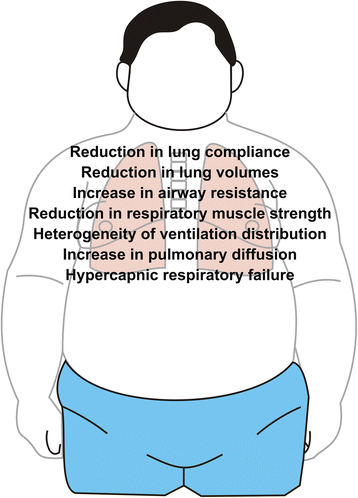Obesity: systemic and pulmonary complications, biochemical abnormalities, and impairment of lung function - PubMed (original) (raw)
Review
Obesity: systemic and pulmonary complications, biochemical abnormalities, and impairment of lung function
Thiago Thomaz Mafort et al. Multidiscip Respir Med. 2016.
Abstract
Obesity is currently one of the major epidemics of this millennium and affects individuals throughout the world. It causes multiple systemic complications, some of which result in severe impairment of organs and tissues. These complications involve mechanical changes caused by the accumulation of adipose tissue and the numerous cytokines produced by adipocytes. Obesity also significantly interferes with respiratory function by decreasing lung volume, particularly the expiratory reserve volume and functional residual capacity. Because of the ineffectiveness of the respiratory muscles, strength and resistance may be reduced. All these factors lead to inspiratory overload, which increases respiratory effort, oxygen consumption, and respiratory energy expenditure. It is noteworthy that patterns of body fat distribution significantly influence the function of the respiratory system, likely via the direct mechanical effect of fat accumulation in the chest and abdominal regions. Weight loss caused by various types of treatment, including low-calorie diet, intragastric balloon, and bariatric surgery, significantly improves lung function and metabolic syndrome and reduces body mass index. Despite advances in the knowledge of pulmonary and systemic complications associated with obesity, longitudinal randomized studies are needed to assess the impact of weight loss on metabolic syndrome and lung function.
Keywords: Lung function; Metabolic syndrome; Obesity.
Figures
Fig. 1
Pulmonary function abnormalities resulting from obesity
Similar articles
- Optimizing respiratory function assessments to elucidate the impact of obesity on respiratory health.
Brazzale DJ, Pretto JJ, Schachter LM. Brazzale DJ, et al. Respirology. 2015 Jul;20(5):715-21. doi: 10.1111/resp.12563. Epub 2015 Jun 1. Respirology. 2015. PMID: 26033636 Review. - Effect of obesity on respiratory mechanics during rest and exercise in COPD.
Ora J, Laveneziana P, Wadell K, Preston M, Webb KA, O'Donnell DE. Ora J, et al. J Appl Physiol (1985). 2011 Jul;111(1):10-9. doi: 10.1152/japplphysiol.01131.2010. Epub 2011 Feb 24. J Appl Physiol (1985). 2011. PMID: 21350021 - Alteration in respiratory physiology in obesity for anesthesia-critical care physician.
Porhomayon J, Papadakos P, Singh A, Nader ND. Porhomayon J, et al. HSR Proc Intensive Care Cardiovasc Anesth. 2011;3(2):109-18. HSR Proc Intensive Care Cardiovasc Anesth. 2011. PMID: 23439281 Free PMC article. - Impact of obesity on pulmonary function: current understanding and knowledge gaps.
Hegewald MJ. Hegewald MJ. Curr Opin Pulm Med. 2021 Mar 1;27(2):132-140. doi: 10.1097/MCP.0000000000000754. Curr Opin Pulm Med. 2021. PMID: 33394747 Review. - Work of breathing and respiratory drive in obesity.
Lin CK, Lin CC. Lin CK, et al. Respirology. 2012 Apr;17(3):402-11. doi: 10.1111/j.1440-1843.2011.02124.x. Respirology. 2012. PMID: 22212441 Review.
Cited by
- The Effects of Asthma on the Association Between Pulmonary Function and Obesity: A 16-Year Longitudinal Study.
Huang YJ, Chu YC, Huang HL, Hwang JS, Chan TC. Huang YJ, et al. J Asthma Allergy. 2021 Apr 8;14:347-359. doi: 10.2147/JAA.S299186. eCollection 2021. J Asthma Allergy. 2021. PMID: 33854341 Free PMC article. - Targeting Adenosine Receptor by Polydeoxyribonucleotide: An Effective Therapeutic Strategy to Induce White-to-Brown Adipose Differentiation and to Curb Obesity.
Mannino F, Pallio G, Bitto A, Altavilla D, Minutoli L, Squadrito V, Arcoraci V, Giorgi DA, Pirrotta I, Squadrito F, Irrera N. Mannino F, et al. Pharmaceuticals (Basel). 2021 Jul 27;14(8):728. doi: 10.3390/ph14080728. Pharmaceuticals (Basel). 2021. PMID: 34451825 Free PMC article. - The Impact of Intermittent Hypoxia-Hyperoxia Therapy on Metabolism and Respiratory System in Obese Patients as Part of Comprehensive Medical Rehabilitation.
Uzun AB, Iliescu M, Stanciu LE, Nedelcu AD, Petcu A, Popescu MN, Beiu C, Petcu LC, Tofolean DE. Uzun AB, et al. Cureus. 2024 Oct 14;16(10):e71501. doi: 10.7759/cureus.71501. eCollection 2024 Oct. Cureus. 2024. PMID: 39544552 Free PMC article. - The influencing of obesity on lung ventilation function among middle-aged and elderly people.
Wang C, Wang Y, Zeng W, Shang S. Wang C, et al. Sci Rep. 2024 Dec 30;14(1):31954. doi: 10.1038/s41598-024-83464-7. Sci Rep. 2024. PMID: 39738616 Free PMC article.
References
- World Health Organization, WHO, Obesity: Preventing and Managing the Global Epidemic. Report of a WHO Consultation (WHO Technical Report Series 894) at http://www.who.int/nutrition/publications/obesity/WHO_TRS_894/en/. Accessed 10 Feb 2016. - PubMed
- Brazilian Association for the Study of Obesity and Metabolic Syndrome, ABESO, Brazilian Obesity Guidelines 2009/2010 at http://www.abeso.org.br/pdf/diretrizes_brasileiras_obesidade_2009_2010_1.... Accessed 22 Jan 2016.
Publication types
LinkOut - more resources
Full Text Sources
Other Literature Sources
